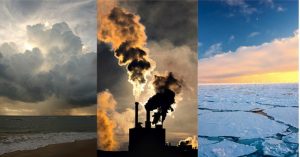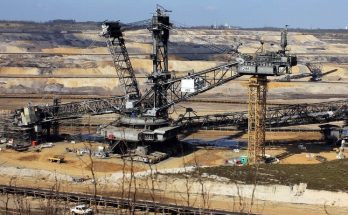
By David Marinelli
We are creatures of this Earth and no other. We were born into and from nature together with myriad other life forms.
The protective blanket of gases that make up the planet’s atmosphere allows the sunlight in by day, warming the planet, and permits the heat to escape into outer space by night, cooling the planet.
The gases that make up the global atmosphere are nitrogen, oxygen, argon, water vapour and carbon dioxide.
These gases, combined in a specific ratio in the atmosphere, have evolved to be so over hundreds of millions of years.
A change in the types, volumes and ratios of the gasses directly impacts the temperature on Earth and the ability of nature to sustain life. This means that many populations and species will become extinct.
Since the industrial revolution in the 1800s human activity has been polluting the atmosphere by releasing gases such as carbon dioxide, methane and nitrous oxide.
Collectively these gases are called greenhouse gases as they do not allow the heat radiating from the Earth to dissipate into space. The heat these gases trap raises the temperature of the atmosphere that in turn warms up the land and the oceans.
The rise in the temperature that we are experiencing on the surface of the Earth and in the oceans is ‘global warming’ and this is causing ‘climate change’ or disastrous and lasting changes in the weather.
The largest contributor to global warming is carbon dioxide. Other greenhouse gases that are emitted in smaller quantities are however more potent in trapping heat than carbon.
For example methane traps 28 to 34 times more heat and nitrous oxide traps 265 to 298 times more heat, than carbon dioxide, over a period of 100 years.
Carbon dioxide is emitted by the burning of fossil fuels in industrial processes, the generation of electricity, by heating, by shipping, land and air transport, by deforestation, degradation and destruction of wild habitats and soils.
Carbon dioxide causes three-quarters of man-made global warming. The carbon concentration in the atmosphere in 2019 was 40% higher than when industrialisation began.
Livestock farming and agriculture are the main contributors of methane which is responsible for 16% of manmade global warming. The liquid manure, faeces and urine of billions of cows, sheep and pigs produce significant quantities of methane as they rot.
Furthermore the hundreds of millions of cows, goats and sheep expel substantial amounts of methane as a result of their digestive processes, contributing substantially to global warming.
Shipping, agriculture and industrial livestock farming contribute to nitrous oxide emissions that make up 6% of manmade greenhouse gases. Fertilizer and manure lagoons associated with industrial pig farms are primarily responsible.
Global greenhouse gas emissions are now at the highest level they have ever been in human history.
The last time the Earth experienced a similar increase was around fifty five million years ago when a large burst of carbon dioxide raised the Earth’s temperature by 8 degrees Celsius (°C). It took 200,000 years for the planet to recover.
It is thought that this prehistoric cataclysmic event was triggered by an initial level of gas emissions that raised the Earth’s temperature by 2°C to 3°C, which is similar to what we will experience.
This triggered a feedback loop as the warming effect reached the ocean floor causing the methane ices to melt and to release huge volumes of methane into the ocean and then into the atmosphere. When feedback loops kick in there is absolutely nothing that can be done to reverse the process.
In 2015 the global temperature increase over pre-industrial times hit 1°C. We are now very close to reaching 1.5°C. It is predicted that by 2030 emissions will exceed the levels needed to keep the global warming increase below 2°C.
Scientists warn that the world is on track for a temperature rise of at least 2.9°C to 3.4°C this century.
The increase will more likely be somewhere between 4°C to 6°C for three reasons: these estimates do not include irreversible feedback loops; as scientists delve deeper into the interconnections between all the elements in the biosphere, the estimates are constantly being revised upwards; humanity’s reaction to this crisis is nowhere near what it should be.
The effects of global warming are catastrophic as the weather is changing everywhere and will become more extreme, people will not be spared.
We must urgently and dramatically reduce greenhouse gas emissions annually starting now. Forests and grasslands absorb carbon dioxide from the atmosphere. We must undertake wholesale restoration of wild habitats and implement large scale reforestation efforts across the planet with urgency.
Main Source: Envirocidal Report by VIVA!
More information from: www.saveearth.world
This article was published in the Senior Times of the Times of Malta on the 22 January 2021



